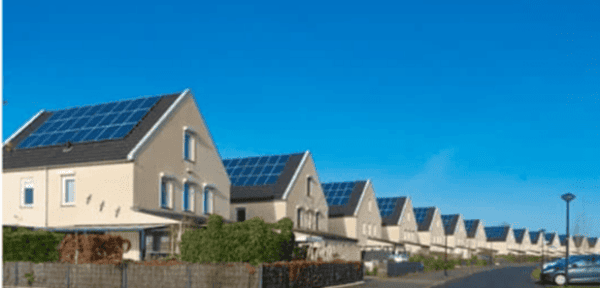Policy changes for the decarbonisation of social housing.

Following the autumn statement, the introduction of two new versions of ECO and both Welsh and Scottish government’s planning changes to their housing standards, there is a lot to consider for how social homes will decarbonise. However, in an already crowded policy space are more schemes and standards really what the sector needs?
This article will provide an overview of the recent announcements to give some clarity on what the expectations now are for social homes and what support there is to achieve them.
Autumn Statement
The autumn statement delivered last November held significant implications for the decarbonisation of the built environment. With the government setting a new interim target to reduce the nation’s energy consumption by 15% by 2030 compared to 2021 levels. To support this goal the government have promised an energy efficiency task force and £6bn funding for efficiency measures between the years 2025 and 2028.
Although the government is yet to announce the specifics of the task force, it has already created excitement within the housing industry. Sector leaders like Hannah Vickers, chief of staff at Mace have recognised the impetus an effective task force could have on accelerating the retrofit market. Equally promising is the £6bn funding which will be added to the Help to Heat pot that has already been earmarked £6.6bn for this Parliamentary session.
The two main schemes through which this funding will be delivered to social homes is the Social Housing and Decarbonisation Fund (SHDF) and the Energy Company Obligation (ECO). The most recent round of SHDF funding, Wave 2.1, is now closed for new applications. However, the next iteration of the ECO scheme, ECO4, came into force in July 2022 and will be running until March 2026.
ECO4
ECO4 will oversee the delivery of £1bn worth of home improvements for each year of operation. In the social housing sector properties between EPC rating band D-G will be supported. The scheme places a minimum improvement requirement on energy companies to elevate EPC bands F-G properties to a band E and band E-D properties to a band C.
Improvements for EPC band E-G homes are limited to insulation, first time central heating, renewable heating, district heating connection and innovation measures. Whist band D homes will only be eligible for innovation measures.
Innovation measures form one of three routes unique to ECO4 which support the delivery of measures that can provide further efficiency improvements, different to those typically supported by ECO. These measures fall under the guise of New Measures and Products (NMAP). Despite there being no obligation for suppliers to use NMAP routes, it creates the opportunity for a greater variety of new technologies to make their way into social housing.
ECO+
As well as supporting more measures, ECO will be opened to a wider pool of homes through ECO+, a complementary fund to ECO4.
Set to launch in spring 2023, ECO + will deliver a further £1bn of home improvements. 80% of which will be for the least efficient homes in council tax bands A-D, who are currently not supported by other schemes. The remaining 20% will mirror ECO4 eligibility.
This will allow energy companies to target more of the least efficient homes in the UK by expanding eligibility passed those on specific means tested benefits.
Energy Efficiency for Social Housing Scotland
In Scotland, the Energy Efficiency Standard for Social Housing post 2020 (EESSH2) is currently under review. The review began in September 2022 after the Zero Emissions Social Housing Task force (ZEST) recommended EESSH2 was looked at again to better align and strengthen it with net zero. The review is being carried out with the help of the social housing sector and is estimated to take nine months, following its completion the recommendations will be up for consultation before the final proposals are submitted to the Scottish Ministers.
During the review process the current 2025 and 2032 milestones are on hold as it seems likely the goalposts of the standard will be moved.
To ensure progress towards decarbonisation is made in the meantime there are a set of interim targets that focus on prioritising cost-effective measures that offer the greatest energy reductions.
Welsh Quality Homes Standard
Similarly, the Welsh government are updating their standards for social housing, having drafted a new version of their Welsh Quality Homes Standard (WQHS), labelled the WQHS2023. The standard is being updated to ensure it more accurately works toward the decarbonisation of the social housing stock. Although the current standard contains some goals for net zero, the updated version takes this a step farther, proposing to set a minimum target for homes to reach an EPC band A and an Environmental Impact Rating of 92 by 2033. This is a progressive approach from Wales, setting the highest standards for social homes in the whole of the UK if the drafted proposals become enshrined.
Finally, with Chris Skidmore’s Net Zero Review having recently been released there may be even more developments to help improve social homes in 2023. After the review recommended that efficiency funding for the least able to pay be expanded, making direct reference to the SHDF, it is likely we will see more funding made available in due course.
Johnnie Leather, Public Policy Researcher